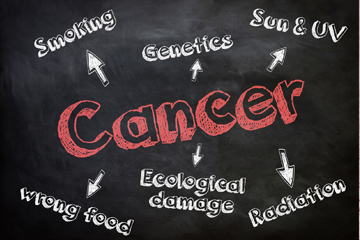According to the American Cancer Society, cancer is the second leading cause of death among both men and women in the United States. The most common causes of cancer are:
- Smoking and tobacco
- Genetics
- Lifestyle choices
- Environmental factors including excessive exposure to the sun and radiation
- Infectious agents
One half of cancer cases are preventable through a healthy lifestyle. You can reduce your risk of cancer by following these recommendations:
- Maintain a healthy weight: Being overweight or obese can increase your risk of several types of cancer. By maintaining your body weight in healthy range and avoiding weight gain in adult life, you can reduce your risk of cancer.
- Eat a plant-based diet: Eating a healthy diet that are high in nutrients and by including colorful vegetables and fruits that can help you to stay lean. Fill two-thirds of your plate with vegetables and whole grains such as brown rice, oatmeal, whole-wheat bread, etc. Avoid sugar-sweetened beverages and alcohol, and reduce the amount of red meat and processed meats like ham, sausages, hot dogs, pepperoni, etc., in your diet. Processed meats can cause cancer substance to form when they are preserved.
- Stay active: Adults should engage in 150 to 300 minutes of moderate-intensity or 75 to 150 minutes of vigorous-intensity physical activity per week. Achieving or exceeding the upper limit of 300 min is optimal. Children and adolescents should engage in one hour of moderate-intensity or vigorous-intensity activity per day. Avoid being sedentary.
- Avoid smoking: Don’t smoke and if you do, quit as fast as possible. Medical oncologist and researcher Dr.Steven Clinton says, “Data shows more than up to one third of all cancers are linked to tobacco”.
- Vaccinate your children against cancer: The HPV (Human Papillomavirus) vaccine is the best protection against HPV related cancer. All boys and girls between the ages 11 and 12 years old should get the HPV vaccine.
- Protect yourself from sun: The best way to protect yourself against skin cancer is to limit your exposure to sun’s UV rays. You can use sunscreen with a min SPF 30 or higher whenever you go out.
- Know your family history: If you have a family history of cancer, you may be at increased risk. Talk to your family and doctor about your medical history, so that the doctor can assess your risk of having cancer and help you to take precautions.
- Screening exams: Screening exams can help to detect cancer early, when it is most treatable. Talk to your doctor about the appropriate screening exams for you based on your gender, age and risk factors.
There’s nothing that can bring your cancer risk to zero, but you make many modifications in your lifestyle to reduce your risk. Be cautious about these things:
- When your car is parked outdoors under the sun in temperatures above 60 degrees F, the dashboard and the seats are heated up. According to a research study, the dashboard, air freshener and the seats emit a cancer-causing toxin called benzene, and if it goes up to 40 times the acceptable level, inhaling this can cause cancer. In addition to this, it also affects kidney, liver and poisons your bones, causes anaemia and reduces WBC. So, when you get into your car, open the windows and doors, and allow some time for the interior air to go out.
- When you are cooking or reheating food using microwave, don’t let plastic wrap, plastic utensils touch food during the microwaving because it may melt, and eating the food will cause carcinogen to enter your body.
- Avoid putting hot water in plastic bottles, and water in plastic bottles stored in warm environments. Plastic bottles can release harmful chemicals into the water if stored in a hot vehicle. This can increase breast cancer risk.
- Use cosmetics that are paraben free. Paraben it is a chemical that affects the mechanisms of normal breast cells and potentially influence their abnormal growth, which leads to increased risk of breast cancer.
Following these guidelines and making simple lifestyle changes can bring down your risk of cancer.
